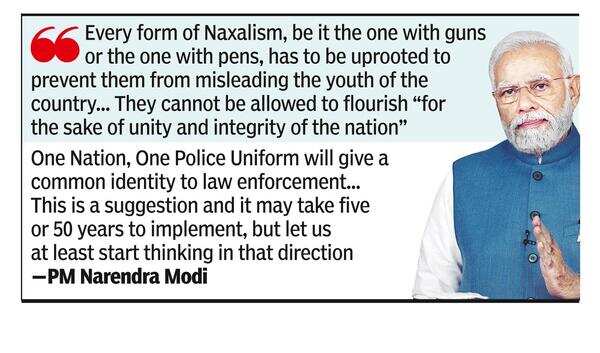“There will be many global forces that may not want India to achieve the level of their capabilities. Competition may eventually breed enmity if India, which is a big market, starts making products itself. We need to think ahead and be prepared to sternly counter such inimical forces. To protect the rights of 99% law-abiding citizens, we have to deal in the strictest possible manner with the 1% forces running a negative campaign against the nation,” Modi stated in his address at the Chintan Shivir in Surajkund.

Particularly focused on tackling left-wing extremist ideology being propagated and some “intellectuals”, he stated: “Every form of Naxalism, be it the one with guns or the one with pens, they have to be uprooted to prevent them from misleading the youth of the country.” Warning that such forces are increasing their intellectual sphere to pervert the minds of coming generations, Modi said they cannot be allowed to flourish “for the sake of unity and integrity of the nation”.
Earlier, the Prime Minister pointed to attempts to disturb public peace through fake news and sought technological advancements to timely stem its spread. He said there is need to educate the common people about analysing and verifying any piece of information before they forward it. To highlight how a single piece of fake news has the capability to snowball into a matter of national concern, he recalled how fake news about job reservations in the past had resulted in losses to the country.
The two-day conference — presided over by home minister Amit Shah and attended by chief ministers, state home ministers, LGs and administrators of UTs and senior officials of various central and state police forces — concluded on Friday with consensus that internal security is the shared responsibility of both the Centre and states.
Among the key assessments shared in the meeting are that Bihar and Jharkhand have become free from left-wing extremism and that peace in the northeast has seen AFSPA area reduced and 9,200 insurgents surrender over the past eight years. It was agreed that focus should be laid on cyber crime, improving conviction rates, narcotics, border security and using forensic science capabilities to achieve 90% conviction rate. States were urged to constantly and annually review goals and have a plan on where their internal security will be in 2047.
The Prime Minister also sought the states’ help to obliterate the ground network of terrorism. He used the Chintan Shivir platform to moot the idea of a common uniform for state police forces across the country. This, he said, will give a common identity to law enforcement as citizens will recognise police personnel anywhere in the country. States can have their number or insignia, Modi suggested. “One Nation, One Police Uniform…I am just putting this forward as a thought for your consideration,” he said while asking the states to take their time to mull the suggestion.
While calling upon all states and Union Territories to work in unison to tackle inter-state and trans-national crimes like terrorism, cyber-offences and smuggling of weapons and drugs via drones, Modi appealed to the chief ministers and home ministers of various states to upgrade their law and order systems with “smart” technological solutions developed via a common platform to ensure uniformity and intra-operability. At the same time, he emphasised upon the state police to not lose focus on human intelligence.
Highlighting that the laws enacted by the central government over the past few years reflect a will to strongly handle corruption, terrorism and hawala, Modi on Friday urged states to also evaluate their own rules and laws and get rid of ones that are outdated.
Modi said that the nation was moving towards permanent peace in hotspots like Jammu & Kashmir, LWE-hit areas and the northeast. “Now we have to focus on rapid development in all these sectors including infrastructure,” he added.
The PM also shared that the central government is working on mission mode for development in the border and coastal areas to promote reverse migration. Stating that this could help curb the smuggling of weapons and drugs in these regions, he sought increased cooperation from the border and coastal states to get the plans into execution.






